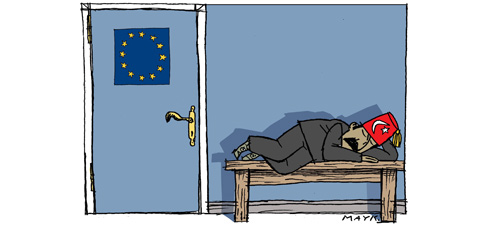What is the opposition doing? If it wanted to, the Republican People's Party (CHP, which established the Turkish Republic) could cause some serious problems for the AKP, the Justice and Development Party of Prime Minister Recep Tayyip Erdogan, simply by more devoting more time to the question of Turkey's membership of the EU.
Five years ago, comprehensive talks that were to lead to Turkey's full membership in the EU began amid general euphoria. Five years on, out of the thirty-five chapters on the table, only thirteen have been opened and only one has been approved. In comparison, Croatia, which began its own proceedings at the same time, has already closed 22 chapters.
Disagreements over Cyprus
Of course, part of the responsibility for the hold up lies with the Europeans. Due to disagreements over Cyprus (half of which is occupied by the Turkish army), eight of the chapters are still on hold, and the EU countries that have expressed opposition to Turkey's membership have blocked yet another five.
But even though Europeans are not always constant, this shouldn’t blind us to what really matters here. Whether or not we Turks become a part of the European Union, the reforms needed to close the thirty-five chapters will have positive repercussions in the daily lives for all the country’s inhabitants. Even if we can’t join the EU, should we renounce changes that are clearly in our best interest?
A fearful government
Because they are afraid of European-style democracy, the opposition parties (the CHP and the extreme-right Nationalist Action Party, MHP) resist the idea of Turkey becoming a part of Europe. Their partisans scream blue murder against a regime which is turning into a "dictatorship". But these people who so fear dictatorship are also afraid of European-style democracy. This explains why the opposition is not pressuring the AKP on the subject of EU membership while the issue is at its lowest ebb and while it fears losing votes when it comes time to integrate European norms into the Turkish system.
These new norms are synonymous with an improvement in the quality of life. However, the accompanying obligations risk alienating those in a number of socio-economic sectors who could turn against a government that doesn’t want to lose their support. But why does this government - so careful not to upset groups that have little respect for the rules - not fear the reaction of a population at large that suffers at the hands of these same groups? The answer is simple: it’s because the people don't know they are being had, and there is no one there to explain this to them.
A food scandal
Let's just take one case, that of food hygiene, to see just what the government has not done. If Turkey did all that it is supposed to do, the people would no longer eat spoiled meat; they would be no more cases of food poisoning, and pregnant women would no longer lose their babies (Taraf recently revealed government negligence in a scandal involving rotten meat that was nonetheless sold to the public). But the population remains ignorant of this. And neither the media nor the opposition has explained this sad reality.
Since the opposition dreads democracy, and the government doesn't want to lose votes, they both prefer to close their eyes when the population is poisoned and they do nothing to integrate European quality standards. For this to happen, the media needs to inform a people that demands its rights. But as long as this is not the case, the Turkish establishment will do nothing to stop these scandals. This is also why the EU negotiations are still barely off the ground.
Ideas
A European referendum to settle the question?
Egemen Bağış, Turkey's chief negotiator with the European Union, recently proposed a referendum, in Turkey and throughout the Union, on the question of EU membership, The Guardian reports. "The word 'referendum' is calculated to strike fear into the hearts of the EU's directoire, but the idea does have its merits", notes the London daily. And "once the hurdles of accession have been been overcome, Turkey's proposal for a referendum offers a solution to the thorny question of whether the outcome should be partnership or political union". As Turkey's president Abdullah Gül has stated, "The important thing is not to enter the union but to adopt its rules", indicating that once the membership process has finished, Turkey might very well decide, like Norway in 1972, not to become a part of the European Union.
Was this article useful? If so we are delighted!
It is freely available because we believe that the right to free and independent information is essential for democracy. But this right is not guaranteed forever, and independence comes at a cost. We need your support in order to continue publishing independent, multilingual news for all Europeans.
Discover our subscription offers and their exclusive benefits and become a member of our community now!












